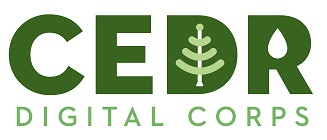
I can proudly say that I was involved with CEDR since Day 1. I was part of a wonderfully diverse, creative, and motivated group of individuals with a shared vision of what digital helpers can do to help during a disaster. We saw major gaps in how vital information was being shared and found ways to help connect those affected by disaster with those trained to keep us all safe.
I currently serve as Chair of the Board of Directors, a rotating position. My primary activities are focused on strategic planning to ensure CEDR and its volunteers have the resources needed to succeed. I also collaborate with the Board to develop long-term development plans to ensure CEDR remains a useful source of information for the public and a resource for emergency responders. These tasks include difficult discussions about how CEDR is best positioned to help others, not just what “the power of the crowd” can accomplish. By focusing on our unique strengths, I and the Board continually strive to raise CEDR’s profile as a valuable source of reliable information when people are at their most vulnerable during a disaster.
I’m most motivated to stay involved with CEDR because of the people! Members of our Board have diverse professional backgrounds, ranging from IT security to health research to project management, which provide essential perspectives about not just how to meet CEDR’s needs but how to navigate the difficult ethical and operational questions associated with disseminating realtime information as disasters unfold. However, our rank and file volunteers are what inspire me the most. CEDR has no paid positions, yet total strangers come together on a regular basis to work long hours to help realize our shared goal: Help people keep themselves safe when disaster strikes. As a data scientist with a PhD in sociology, I know this kind of collective action is rare, thus we need to respect and highlight the crucial work our volunteers do on a daily basis. They are the ones trailblazing entirely new ways to support communities, even new ways to be a community in the digital era.
I am most proud to see CEDR continue doing what it does best, year after year: Help. Whatever my personal contribution has been, it pales in comparison to the joint effort necessary just to found CEDR Digital Corps let alone the energy needed to respond – quickly, deliberately, and appropriately – to countless disasters across the United States. The fact that this work continues on a regular basis using a standard playbook CEDR volunteers developed over time makes me smile every time I think about it, even as I write about it now.
The most important work that CEDR does is providing reliable information to disaster victims in a timely manner. The federated nature of disaster response in the United States makes this work all the more vital since there exist few channels of communication between most government entities in charge of emergency management, even between adjacent counties. Filling that information gap, alone, provides a valuable service for both citizens and government organizations.
When I’m not working or volunteering, I love spending time with my family, but I also enjoy restoring vintage (i.e., vacuum tube) audio equipment. My proudest achievement, so far, has been restoring a Bogen RP-235 broadcast receiver. I also enjoy online gaming. During the pandemic, I was able to reconnect with old friends in New Jersey through weekly Civilization VI multiplayer games, though I’ve also led my share of (vanilla) World of Warcraft raids, too.
